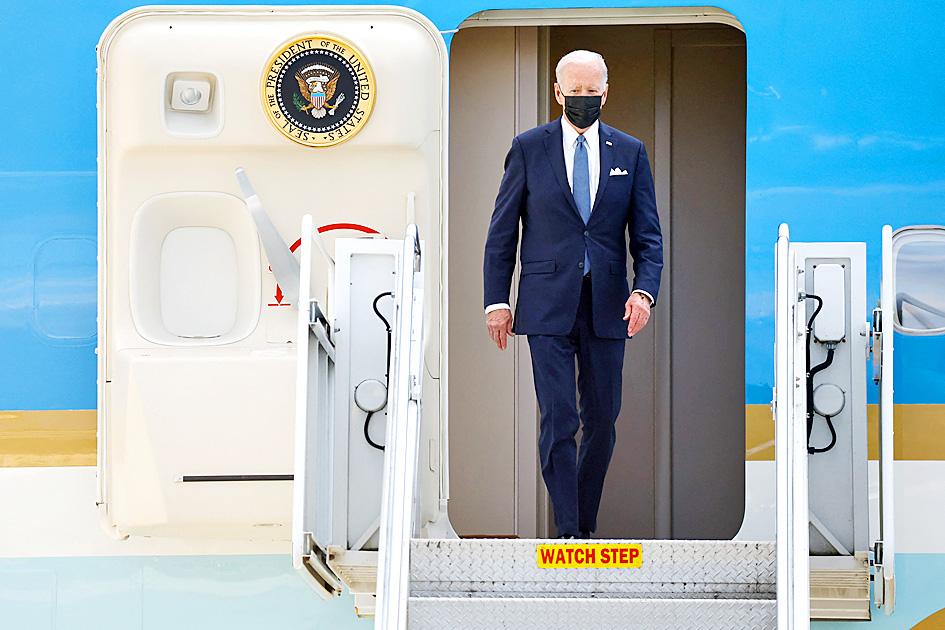US President Joe Biden yesterday arrived in Japan to launch a plan for greater US economic engagement with the Indo-Pacific region, facing criticism even before the program is announced that it would offer scant benefit to countries in the region.
On the second leg of his first Asia trip as president, Biden is to meet with leaders of Japan, India and Australia, the Quadrilateral Security Dialogue (Quad), another cornerstone of his strategy to push back against China’s expanding influence.
At their previous summit in March, Quad leaders agreed that what has happened to Ukraine should not be allowed to happen in the Indo-Pacific — a reference to the threat posed to Taiwan by China, although Beijing was not mentioned by name.

Photo: Reuters
Biden was yesterday to meet with Japanese business leaders, including the president of Toyota Motor Corp, at the ambassador’s residence in Tokyo shortly after arriving, said a person familiar with the matter.
Today, he is to call on Emperor Naruhito before talks with Japanese Prime Minister Fumio Kishida. He and Kishida are expected to discuss Japan’s plans to expand its military capabilities and reach in response to China’s growing might.
Biden plans to roll out the Indo-Pacific Economic Framework (IPEF), a program to bind regional countries more closely through common standards in areas including supply chain resilience, clean energy, infrastructure and digital trade.
Washington has lacked an economic pillar to its Indo-Pacific engagement since former US president Donald Trump quit a multinational trans-Pacific trade agreement, leaving the field open to China to expand its influence.
However, the IPEF is unlikely to include binding commitments, and Asian countries and trade experts have given a decidedly lukewarm response to a program limited by Biden’s reluctance to risk US jobs by offering the increased market access the region craves.
The White House had wanted the IPEF announcement to represent a formal start of negotiations with a core group of like-minded countries, but Japan wanted to ensure broader participation to include as many Southeast Asian countries as possible, trade and diplomatic sources said.
Given this, today’s ceremony would likely signal an agreement to start discussions on the IPEF rather than actual negotiations, the sources said.
Beijing appeared to take a dim view of the planned IPEF.
China welcomes initiatives conducive to strengthening regional cooperation, but “opposes attempts to create division and confrontation,” Chinese Minister of Foreign Affairs Wang Yi (王毅) said in a statement.
“The Asia-Pacific should become a high ground for peaceful development, not a geopolitical gladiatorial arena,” he said.
Wang said the “so-called ‘Indo-Pacific strategy’ is essentially a strategy to create division, a strategy to incite confrontation and a strategy to undermine peace.”
Some members ASEAN could join the IPEF launch ceremony, an Asian diplomat said, but a Japanese Ministry of Finance official said many in the region were reluctant because of the lack of practical incentives like tariff reductions.
Tomorrow in Tokyo, Biden is to join the second in-person Quad summit.
The four countries share concerns about China, but the Quad as a group has avoided an overtly anti-China agenda, largely due to Indian sensibilities.

A magnitude 7.0 earthquake struck off Yilan at 11:05pm yesterday, the Central Weather Administration (CWA) said. The epicenter was located at sea, about 32.3km east of Yilan County Hall, at a depth of 72.8km, CWA data showed There were no immediate reports of damage. The intensity of the quake, which gauges the actual effect of a seismic event, measured 4 in Yilan County area on Taiwan’s seven-tier intensity scale, the data showed. It measured 4 in other parts of eastern, northern and central Taiwan as well as Tainan, and 3 in Kaohsiung and Pingtung County, and 2 in Lienchiang and Penghu counties and 1

FOREIGN INTERFERENCE: Beijing would likely intensify public opinion warfare in next year’s local elections to prevent Lai from getting re-elected, the ‘Yomiuri Shimbun’ said Internal documents from a Chinese artificial intelligence (AI) company indicated that China has been using the technology to intervene in foreign elections, including propaganda targeting Taiwan’s local elections next year and presidential elections in 2028, a Japanese newspaper reported yesterday. The Institute of National Security of Vanderbilt University obtained nearly 400 pages of documents from GoLaxy, a company with ties to the Chinese government, and found evidence that it had apparently deployed sophisticated, AI-driven propaganda campaigns in Hong Kong and Taiwan to shape public opinion, the Yomiuri Shimbun reported. GoLaxy provides insights, situation analysis and public opinion-shaping technology by conducting network surveillance

‘POLITICAL GAME’: DPP lawmakers said the motion would not meet the legislative threshold needed, and accused the KMT and the TPP of trivializing the Constitution The Legislative Yuan yesterday approved a motion to initiate impeachment proceedings against President William Lai (賴清德), saying he had undermined Taiwan’s constitutional order and democracy. The motion was approved 61-50 by lawmakers from the main opposition Chinese Nationalist Party (KMT) and the smaller Taiwan People’s Party (TPP), who together hold a legislative majority. Under the motion, a roll call vote for impeachment would be held on May 19 next year, after various hearings are held and Lai is given the chance to defend himself. The move came after Lai on Monday last week did not promulgate an amendment passed by the legislature that

AFTERMATH: The Taipei City Government said it received 39 minor incident reports including gas leaks, water leaks and outages, and a damaged traffic signal A magnitude 7.0 earthquake struck off Taiwan’s northeastern coast late on Saturday, producing only two major aftershocks as of yesterday noon, the Central Weather Administration (CWA) said. The limited aftershocks contrast with last year’s major earthquake in Hualien County, as Saturday’s earthquake occurred at a greater depth in a subduction zone. Saturday’s earthquake struck at 11:05pm, with its hypocenter about 32.3km east of Yilan County Hall, at a depth of 72.8km. Shaking was felt in 17 administrative regions north of Tainan and in eastern Taiwan, reaching intensity level 4 on Taiwan’s seven-tier seismic scale, the CWA said. In Hualien, the